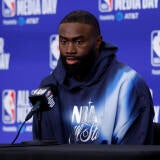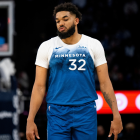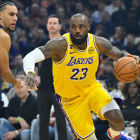
Karl-Anthony Towns injury: Timberwolves' offense plummets without KAT, and their title chances could too
The Wolves have a lousy offensive rating without Towns, and his injury could derail their best season in 20 years

The Minnesota Timberwolves look like serious contenders in the Western Conference for the first time in two decades, but their hopes of making a deep playoff run were dealt a potentially serious blow on Thursday with reports that All-Star big man Karl-Anthony Towns will be undergoing surgery for a torn meniscus in his left knee.
The team began a six-game road trip on Thursday with a matchup against the Indiana Pacers, and Towns did not travel with the team, according to Shams Charania. Per ESPN's Adrian Wojnarowski, Towns will be re-evaluated in one month, and "it's expected Towns will return by early in the Western Conference playoffs."
Regardless, Towns is going to miss time, and, in the immediate future, that will impact the Wolves' battle for the No. 1 seed in the Western Conference. Following Thursday's win over the Pacers, the Timberwolves improved to 44-19 and reclaimed the No. 1 seed in the Western Conference, ahead of the Oklahoma City Thunder, who are at 43-19. As of this writing, Minnesota has a 1.5-game lead on the third-place Denver Nuggets and a three-game advantage on the fourth-place Los Angeles Clippers.
Maintaining that spot without Towns for the foreseeable future will be a monumental task. If this six-game, cross-country road trip against multiple playoff-caliber teams wasn't a big enough challenge, they face the Nuggets, Cleveland Cavaliers and Golden State Warriors in their first three games upon returning home. Towns won't be available for any of those games, which will all happen within the next three weeks prior to his re-evaluation.
The West is too congested to have any idea of how a slide down the standings would impact their first-round matchup, but even a small slip to third place would have a major effect on their chances in the playoffs. The No. 1 seed has home-court advantage throughout the West playoffs, while the No. 3 seed only has home-court in the first round (assuming all the top seeds advance).
To their credit, the Wolves have been one of the league's best road teams this season. Their 21 wins away from home are the most in the league, and their .698 winning percentage is second only to the Boston Celtics. Still, this is a young team representing a franchise that hasn't won a playoff series since 2004. They're going to want as many home games as possible.
As for how they'll play without Towns, the obvious issue is the offensive end. One of the most versatile big men we've ever seen, Towns is second on the team in scoring (22.1 points per game), second in offensive rebounding (1.5), second in 3-pointers made (2.2) and attempted (5.3), second in 3-point percentage (42.3) and fourth in assists (3.0). Prior to this season no seven-footer in NBA history has averaged at least 20 points on 50% shooting or better while taking five or more 3s a night.
Towns' ability to score from all over the floor at an efficient clip while also getting to the free-throw line is something the Wolves simply won't be able to replace over an extended period. When he's on the floor, they have an offensive rating of 116.5, which is equivalent to 15th in the league. When Towns sits, the offensive rating plummets to 106.1, which would rank last in the league by a full point.
The flip side is their already elite defense should get even better without Towns. While he's improved on that end, he's still the weakest link in their starting lineup and despite having 62 points in a game earlier this season, he was benched down the stretch for his poor effort.
For the season, the Wolves have the best defense in the league by a wide margin, with their 108.0 defensive rating more than two points better than the second-place Celtics. Naz Reid will likely take Towns' place in the starting lineup, and in the 67 minutes he's played alongside the Wolves' other four primary starters (Mike Conley, Anthony Edwards, Jaden McDaniels and Rudy Gobert), the Wolves have an unheard of 82.3 defensive rating.
That's a small sample size and it's unfair to expect them to keep that up over more minutes, but just for the sake of comparison, the NBA's stats site goes back to the 1996-97 season. Since then, the lowest defensive rating a team has recorded for a full season is 93.1 by the San Antonio Spurs in 2004.
Of course, it must be noted that the Reid-plus-the-starters lineup has a 101.4 offensive rating, which is nearly six points worse than the worst offense in the league this season. And therein lies the rub for the Wolves. How do they keep the offense afloat so that their defense can carry them?
That's been the primary question all season, and it will be even harder to solve without Towns.
Edwards is already averaging 26.5 points per game with a 32.2 usage rate. How much more can you realistically expect from him? Gobert cannot take on a bigger offensive role even if he wanted to. Naz Reid's touches will go up, but can he maintain his efficiency when that happens? Mike Conley and Jaden McDaniels are the only other players scoring in double figures. Conley's offense is extremely inconsistent at this stage of his career and McDaniels has never been known as a scorer. Recent additions Monte Morris and TJ Warren might help, but to what extent?
SportsLine projects the Wolves to go 11-9 in their final 20 games if Towns misses the rest of the regular season (vs. 13-7 if he was healthy). And if KAT returns for the playoffs, SportsLine still gives Minnesota a 12.2% chance to win the West and a 4.3% chance to win the title.
There's a reason the Wolves have struggled on offense all season long without Towns on the floor. At some point, you have to put the ball in the basket, and as great as they have been, and will continue to be defensively, their hopes of making a deep playoff run may be in real trouble if Towns isn't back.


















